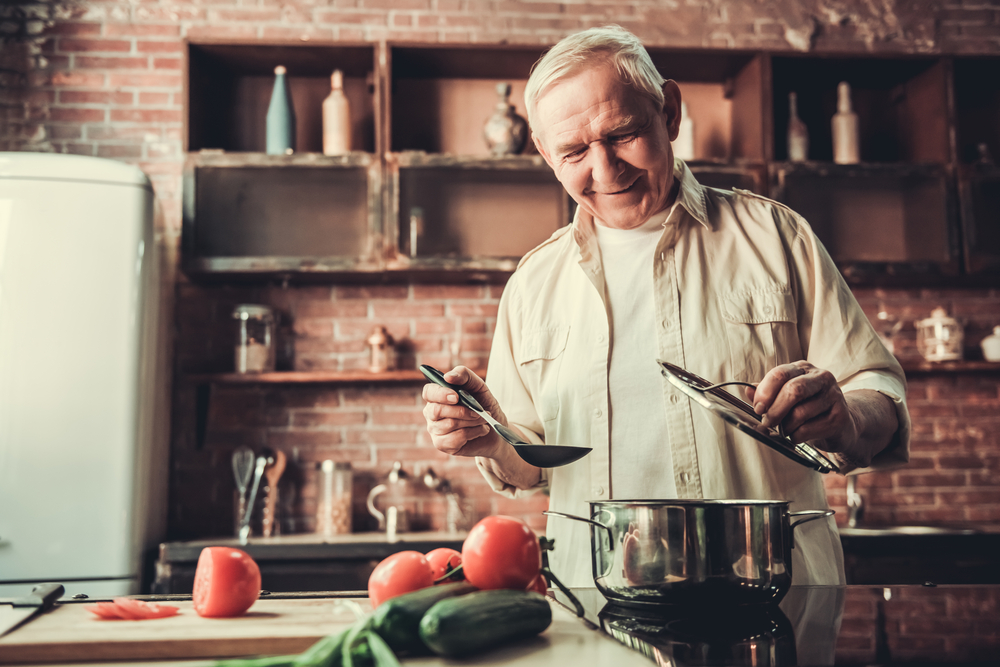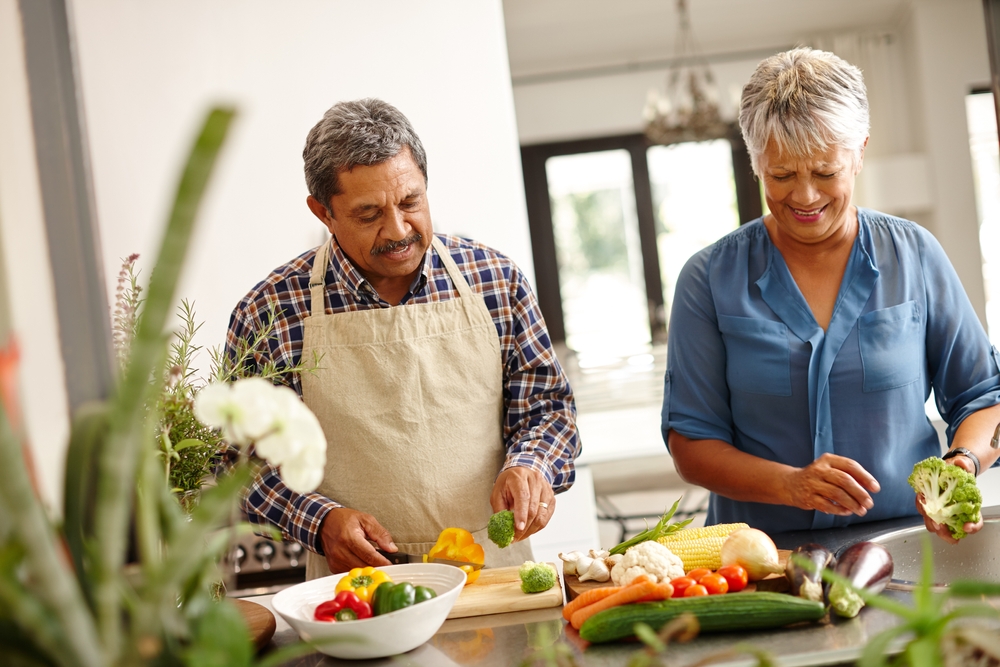 November 3, 2025
November 3, 2025
Key Takeaways:
- Kitchen Safety is Crucial – Your senior might find cooking or baking more of a challenge now due to safety concerns.
- Preventing Trips and Falls is Just the Start – The biggest aspect of safety that comes to mind is fall prevention, however, kitchen safety is more than that.
- Think of Cabinets, Appliances, and Tools when Assessing for Safety – Accidents can happen if things aren’t properly placed within reach, or stored in crowded areas.
- Fire Prevention Shouldn’t Be Overlooked – Properly handling hot items and keeping the stovetop free from clutter can also prevent accidents from happening.
- Benefits of Keeping Hobbies Alive – Seniors need things in their lives that spark joy just as much as anyone else. Hobbies give them that serotonin necessary to maintain good mental health.
As we age, our ability to participate in the hobbies we’ve always loved comes with new challenges. Often, these challenges prevent our loved ones from finding joy in these activities. Especially if doing so potentially creates a health hazard for your senior.
One hobby that can sometimes fall to the wayside due to these challenges is cooking. Seniors become nervous about causing themselves harm with both kitchen appliances and tools such as knives and other sharp utensils.
So, how do we combat these feelings? By making adjustments and ensuring their safety can still be met even while cooking. Giving your loved one even a small bit of their independence and confidence back can go a long way toward their overall health.
Preventing Slips, Trips, and Falls
There are many potential hazards that can crop up when cooking in your home kitchen. Below are some kitchen safety tips that are specific to fall prevention.
Immediately Wipe Up Spills
One of the fun parts of cooking when we are younger is the mess. However, as we get older, that same mess can cause some physical harm if not handled promptly. A simple spill could mean a trip to the hospital for a senior if they aren’t careful.
To prevent slipping and falling due to a spill or dropped food ingredients, encourage your loved one to be aware of their surroundings. Also, encourage them to clean as they go to avoid accidents as much as possible.
Remove Any Trip Hazards
As we age, it becomes more and more difficult to move without losing our balance or accidentally tripping on things we never did before. That is why it’s recommended that seniors avoid having any kind of rug in their kitchen area.
The floor should always be free of any hazards in order to keep our loved ones safe. This can also include the placement of certain kitchen amenities or cleaning tools. Everything that can be stored elsewhere should be.
Another way to prevent tripping is to wear non-slip shoes instead of cooking barefoot or in slippers.
Update Cabinet and Counter Access
Often, slipping and falling comes as a result of out-of-reach cabinets or cluttered countertops. Seniors are more likely to have balance issues, so preventing them from having something easily within reach or something to grab onto for leverage can cause physical harm.
If you can’t adjust where the cabinets are in your loved one’s home, consider only utilizing the ones they can easily reach on their own. Put their most important tools, cooking spices, and dishes in the spaces that are within arms length. If you must stretch to reach places, having a sturdy stepladder is advised.
Cooking Safety Tips
Cooking should be fun and as effortless as possible. By taking steps to ensure things are safe before getting started, it still can be no matter your age or physical abilities. Check out our suggestions to achieve this in your own home.
Ensure Proper Lighting
Excellent lighting significantly improves kitchen safety. A well-lit kitchen makes it easier to spot potential hazards, such as spills on the floor, thereby preventing slips and falls. It also aids in safe food preparation by allowing for clear reading of recipes, accurate ingredient measurement, and reduced risk of cuts while chopping.
You can achieve this by ensuring the main light in the kitchen is bright and provides a wide coverage area. Then, if possible, make sure there are lights in specific areas, such as where your senior will be cutting or prepping the food.
Fire Prevention is Key
Cooking safety starts with being mindful of fire hazards. The single most important rule is to never leave food cooking on the stovetop unattended. If you need to step away, even for a moment, turn off the burner.
Create an area around your stove, approximately 3 feet in diameter, that is clear of anything flammable. This includes oven mitts, paper towels, food packaging, and dishcloths. Be mindful of what you’re wearing; long, flowing sleeves can easily catch fire, so opt for short or close-fitting sleeves.
Finally, make sure there is a smoke detector in or near your kitchen and that it is properly working. You will also want to keep a fire extinguisher nearby in case of an emergency.
Carefully Handle Hot Items
Kitchen accidents, especially burns from hot surfaces, liquids, and steam, are common. To prevent these, always use thick, dry oven mitts or pot holders when handling items from the oven or microwave, as damp cloths can transfer heat.
Be especially careful with steam. When opening a hot pot or microwaved container, tilt the lid away from your face and hands to allow steam to escape safely. Before removing a hot dish from the oven, ensure a clear, heat-proof spot, such as a trivet or wooden cutting board, is ready on the counter.
An Organized Kitchen is a Safe Kitchen
A cluttered, disorganized kitchen can be a significant hazard, especially for seniors. When countertops are messy and cabinets are overflowing, the risk of accidents increases. Creating an organized space is one of the most proactive kitchen safety tips because it builds a foundation of predictability and efficiency, directly contributing to senior home safety.
Properly Store Kitchen Appliances and Tools
The core principle of safe storage is accessibility. Store the items you use every day—like your favorite pan, go-to spices, and dinner plates—on shelves that are between waist and shoulder height. This “safe zone” eliminates the need to strain by reaching too high or bending too low, which can cause muscle pulls or loss of balance.
Store heavy items like crockpots and stand mixers on lower shelves for easy sliding. Lighter, less-used items can go higher. As we mentioned above, use a sturdy step stool with a non-slip base and handrail for out-of-reach necessities; never use unstable substitutes. Smart organization is key to senior home safety.
Create Logical “Zones”
Group similar items together to create a logical workflow. For example, keep all your baking supplies (flour, sugar, mixing bowls) in one cabinet. Store cutting boards and knives near the area you use for prep. Keep spices, oils, and cooking utensils near the stove.
By creating these zones, you reduce the need to walk back and forth across the kitchen, which minimizes movement and can prevent fatigue or rushing—a key component of cooking safety.
Declutter Countertops and Cabinets
Like we briefly mentioned earlier in this blog, crowded countertops and cabinets can create unintentional safety hazards for seniors. Keeping counters clear makes cleaning easier and reduces the risk of cross-contamination. It also minimizes the likelihood of spills or falls caused by items being accidentally knocked over.
Your countertops are the primary stage for cooking. When they are cluttered with mail, appliances, and other items, you have less room for safe food preparation. This can lead to knives being placed in precarious positions or not having a clear, heat-proof spot to set down a hot pan.
Benefits of Keeping Hobbies Alive
Now that we’ve discussed the ins and outs of creating a safe kitchen environment, let’s briefly discuss why keeping hobbies such as cooking is crucial to overall good health in seniors.
Hobbies are necessary for seniors who wish to practice proper self-care or just want to keep themselves emotionally well. These activities provide serotonin, which in turn relaxes worries and anxieties. Focusing on a task can provide your loved ones with some much-needed “me time.”
So, naturally, encouraging your senior to continue cooking despite their insecurities about safety in the kitchen will go a long way toward helping them regain their confidence. Being a supportive shoulder they can lean on will help them take that first step and regain the joy they used to find in providing food for themselves and others.
Creating Safe Environments for All Our Loved Ones
All of Accessible’s caregivers are dedicated to ensuring your loved ones get the best quality care they can. A significant part of that is focusing on senior home safety. We train all our caregivers to recognize any potential hazards in the home and create lasting solutions to prevent them.
Cooking is a big part of life, and our caregivers are happy to support your senior as they cook for themselves. Sharing the burden will make cooking all the more fun, no matter what new challenges have come up in your loved one’s life.
If you are interested in learning more about our services or how to ensure kitchen safety, contact us. We can’t wait to help support you and your family.



